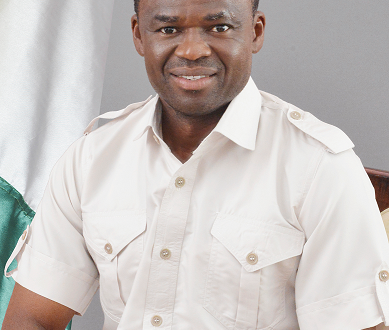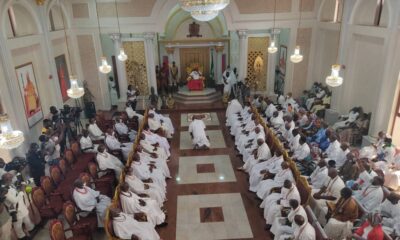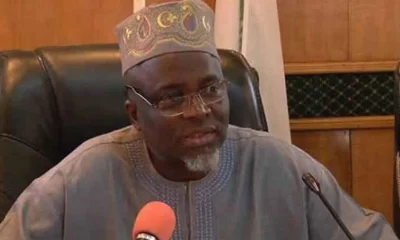Headline
Tanzanian Abdulrazak Gurnah Awarded Nobel Literature Prize
Published
3 years agoon
By
Editor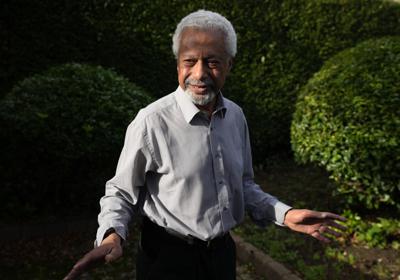
U.K.-based Tanzanian writer Abdulrazak Gurnah, whose experience of crossing continents and cultures has fed his novels about the impact of migration on individuals and societies, won the Nobel Prize for Literature on Thursday.
The Swedish Academy said the award was in recognition of Gurnah’s “uncompromising and compassionate penetration of the effects of colonialism and the fate of the refugee.”
Gurnah, who recently retired as a professor of post-colonial literatures at the University of Kent, got the call from the Swedish Academy in the kitchen of his home in southeast England — and initially thought it was a prank.
He said he was “surprised and humbled” by the award.
Gurnah said the themes of migration and displacement that he explored “are things that are with us every day” — even more now than when he came to Britain in the 1960s.
“People are dying, people are being hurt around the world. We must deal with these issues in the most kind way,” he said.
“It’s still sinking in that the Academy has chosen to highlight these themes which are present throughout my work, it’s important to address and speak about them.”
Born in 1948 on the island of Zanzibar, now part of Tanzania, Gurnah moved to Britain as a teenage refugee in 1968, fleeing a repressive regime that persecuted the Arab Muslim community to which he belonged.
He has said he “stumbled into” writing after arriving in England as a way of exploring both the loss and liberation of the emigrant experience.
Gurnah is the author of 10 novels, including “Memory of Departure,” “Pilgrims Way,” “Paradise” — shortlisted for the Booker Prize in 1994 — “By the Sea,” “Desertion” and “Afterlives.” The settings range from East Africa under German colonialism to modern-day England. Many explore what he has called “one of the stories of our times”: the profound impact of migration both on uprooted people and the places they make their new homes.
Gurnah, whose native language is Swahili but who writes in English, is only the sixth Africa-born author to be awarded the Nobel for literature, which has been dominated by European and North American writers since it was founded in 1901.
Nigerian writer Wole Soyinka, who won the Nobel Literature prize in 1986, welcomed the latest African Nobel laureate as proof that “the Arts — and literature in particular — are well and thriving, a sturdy flag waved above depressing actualities” in “a continent in permanent travail.”
READ ALSO: Full Speech Of President Buhari’s 2022 Budget Presentation
“May the tribe increase!” Soyinka told the AP in an email.
Anders Olsson, chairman of the Nobel Committee for literature, called Gurnah “one of the world’s most prominent post-colonial writers.” He said it was significant that Gurnah’s roots are in Zanzibar, a polyglot place that “was cosmopolitan long before globalization.”
“His work gives us a vivid and very precise picture of another Africa not so well known for many readers, a coastal area in and around the Indian Ocean marked by slavery and shifting forms of repression under different regimes and colonial powers: Portuguese, Indian, Arab, German and the British,” Olsson said.
He said Gurnah’s characters “find themselves in the gulf between cultures … between the life left behind and the life to come, confronting racism and prejudice, but also compelling themselves to silence the truth or reinventing a biography to avoid conflict with reality.”
Luca Prono said on the British Council website that in Gurnah’s work, “identity is a matter of constant change.” The academic said Gurnah’s characters “unsettle the fixed identities of the people they encounter in the environments to where they migrate.”
News of the award was greeted with excitement in Zanzibar, where many remembered Gurnah and his family — though few had actually read his books.
Gurnah’s books are not required reading in schools there and “are hardly to be found,” said the local education minister, Simai Mohammed Said, whose wife is Gurnah’s niece. But, he added, “a son of Zanzibar has brought so much pride.”
“The reaction is fantastic. Many are happy but many don’t know him, though the young people are proud that he’s Zanzibari,” said Farid Himid, who described himself as a local historian whose father had been a teacher of the Quran to the young Gurnah. “I have not had the chance to read any of his books, but my family talked about it.”
Gurnah didn’t often visit Zanzibar, he said, but he has suddenly become the talk of young people in the semiautonomous island region.
“And many elder people are very, very happy. Also me, as a Zanzibari. It’s a new step to make people read books again, since the internet has taken over.”
The prestigious award comes with a gold medal and 10 million Swedish kronor (over $1.14 million). The money comes from a bequest left by the prize’s creator, Swedish inventor Alfred Nobel, who died in 1895.
Last year’s prize went to American poet Louise Glück. Glück was a popular choice after several years of controversy. In 2018, the award was postponed after sex abuse allegations rocked the Swedish Academy, the secretive body that chooses the winners. The awarding of the 2019 prize to Austrian writer Peter Handke caused protests because of his strong support for the Serbs during the 1990s Balkan wars.
On Monday, the Nobel Committee awarded the prize in physiology or medicine to Americans David Julius and Ardem Patapoutian for their discoveries into how the human body perceives temperature and touch.
The Nobel Prize in physics was awarded Tuesday to three scientists whose work found order in seeming disorder, helping to explain and predict complex forces of nature, including expanding our understanding of climate change.
Benjamin List and David W.C. MacMillan were named as laureates of the Nobel Prize for chemistry Wednesday for finding an easier and environmentally cleaner way to build molecules that can be used to make compounds, including medicines and pesticides.
Still to come are prizes for outstanding work in the fields of peace, on Friday, and economics, on Monday.
(AP)
You may like
Headline
PICTORIAL: C&S Church Ayo Ni O Installs New Leader
Published
10 hours agoon
May 2, 2024By
Editor
The Cherubim and Seraphim (S&S) Movement Church Worldwide, on Wednesday, formally installed Prophet Emmanuel Alogbo as the 6th Baba Aladura and spiritual head of the church.
Alogbo was appointed the acting spiritual head in November 2023 following the death of his predecessor, Samuel Abidoye, who died on November 12, at the age of 103.
A statement published on the official website of the church reads, “The ascension of Most Senior Special Prophet Dr. Emmanuel Abiodun Alogbo to the revered position of Spiritual Father and Chairman of the Cherubim and Seraphim Movement Church signifies a pivotal moment in the history of the church, ushering in a new era of leadership and guidance for its global congregation.”
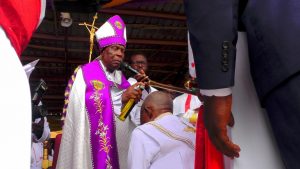
READ ALSO: Officer Who Shot Man Dead During Fuel Queue Tumult Identified — Lagos Police
Alogbo’s installation was reported to have been attended by important figures in the church, “including the Olori of Cherubim and Seraphim Unification, His Most Eminence Pro. Dr. S. A. Alao J.Pil., who performed the anointment, which added to the solemnity and grandeur of the occasion.”
Alao was said to have charged the new Baba Aladura to embrace his role with strength and courage.
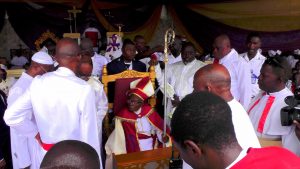
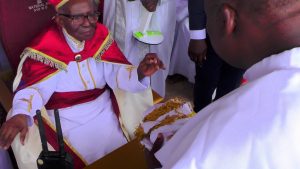
Congregants were also said to have recognised Alogbo as an embodiment of divine wisdom, compassion, and spiritual insight.
In his pledge to the CSMC Worldwide, the new Baba Adura was quoted assaying, “I solemnly pledge to continue the good work of moving our beloved church forward, which the late Baba Aladura Prophet Samuel Adefila Abidoye started.
“It is my firm commitment to ensure that the C&S Movement Church continues to march on, spreading its message of faith and love to all corners of the globe.”
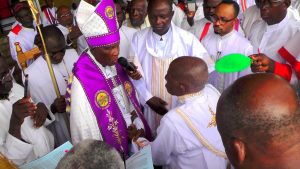
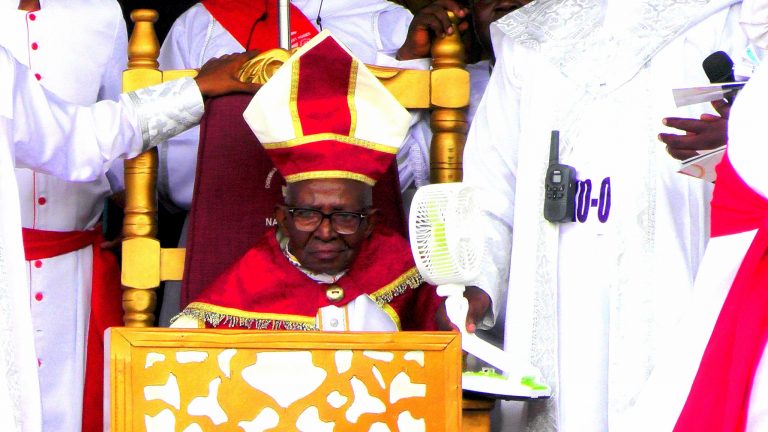
Headline
Nigerian Man Extradited From Malaysia, Convicted For $6.3m Fraud In US
Published
13 hours agoon
May 2, 2024By
Editor
A federal jury in New Haven, Connecticut, Wednesday, convicted an extradited Nigerian national, Okechukwu Osuji, for engaging in a business email compromise scheme out of multiple countries, including the United States.
This was revealed in a statement by the US Department of Justice on Thursday, saying that Osuji and his accomplices, John Wamuigah and Tolulope Bodunde defrauded their victims of over $6.3 million.
The jury convicted Osuji of conspiracy to commit wire fraud, wire fraud, and aggravated identity theft.
Principal Deputy Assistant Attorney General Nicole M. Argentieri, head of the Justice Department’s Criminal Division, said, “Osuji led a network of scammers in Malaysia and elsewhere in a sophisticated business email compromise scheme to defraud victims of millions of dollars.”
READ ALSO: Nigerian Sues Malaysia Govt N406m For Unlawful Detention
“Today’s conviction is another example of how the department’s collaboration with international law enforcement partners enables us to bring cybercriminals to justice in the United States.”
US Attorney Vanessa Roberts Avery for the District of Connecticut added, “While it is often difficult to identify and bring to justice cybercriminals operating overseas, today’s verdict demonstrates the expertise of the FBI and Stamford Police in uncovering this criminal network, and the shared commitment of our counterparts in Malaysia to ensure that fraudsters are held accountable in a court of law.
“We will continue to work to root out those who engage in internet fraud schemes, no matter where in the world they operate, and achieve justice for victims of these crimes.”
“The defendant perpetrated a complex international business email compromise scheme and laundered millions in stolen proceeds,” said Executive Assistant Director Timothy R. Langan Jr. of the FBI’s Criminal, Cyber, Response, and Services Branch.
READ ALSO: EFCC Arraigns Nigerian Who Posed As Woman To Dupe Malaysian
“This conviction is the result of hard work and close collaboration between the FBI and our local and international partners. Together, we will work aggressively to bring to justice anyone who engages in fraud and theft against Americans, no matter where they are in the world.”
“Today’s verdict provides a bit of closure to some victims of these often financially crippling crimes,” said Special Agent in Charge Robert Fuller of the FBI New Haven Field Office.
“It also displays our international ability to bring criminal actors to justice despite the complexities of their crimes. We want to thank all of our law enforcement partners here and abroad, as well as the U.S. Attorney’s office, for their dedication to serving justice.”
READ ALSO: Naira Abuse: EFCC, Cubana Chief Priest To Settle Out Of Court
Osuji who was deported by Osuji is slated to be sentenced on July 24 and faces a mandatory minimum of two years on the identity theft count and a maximum penalty of 60 years in prison on the wire fraud and conspiracy counts.
A Federal District Court judge will determine any sentence after considering the US Sentencing Guidelines and other statutory factors.
Osuji was arrested in Malaysia and extradited to the US in 2022. His alleged co-conspirator, Wamuigah, remains in Malaysia and is pending extradition proceedings, while another co-conspirator, Bodunde, pleaded guilty on February 16.
Headline
How Two Kenyan School Dropouts Made Prosthetic Arms For People With Disabilities
Published
21 hours agoon
May 2, 2024By
Editor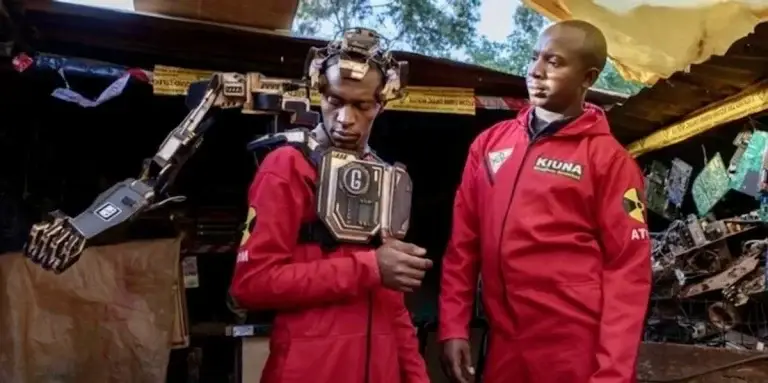
Two young Kenyan inventors have invented bio-robotic prosthetic arms from waste materials to help improve the lives of the physically challenged people in 2021.
Both David Gathu and Moses Kiuna were at the age of 29 when they designed a bio-robotic prosthetic arm in helping the people that have lost their limbs.
Recounting their ordeal before venturing into the invention, the duo said they were forced to drop out of college because of the expensive school fees but did not let the challenges steal their vision.
Gathu and Kiuna accomplished their dream to help their communities in a workshop in Kiambu county in Kikuyu, Kenya, north of the capital Nairobi.
READ ALSO: 14-year-old Boy Killed In London Sword Attack
According to Face to Face Africa, the workshop was basically a shed made out of worn-out rusted iron sheets standing next to a chicken coop.
The floor was covered with gravel, making the ground outside the shop and the interior all but indistinguishable, as brown broken glass with tape all around fits the window frame.
Brain signal bio-robotic arm
Another significant thing about the invention was being the world’s first bio-robotic arm operated by brain signals. The invention, which is controlled by brain signals, has been billed as a game-changer in the lives of disabled people in Kenya.
Gathu and Kinyua’s invention was unique and different from most prosthetic technology which is powered by a person’s muscles.
READ ALSO: Woman Reveals Secret To Longevity As She Celebrates 106th Birthday
The arm works by converting brain signals into an electric current by a “NeuroNode” biopotential headset receiver. NeuroNode biopotential was originally invented to help people suffering from paralysis and speech loss.
Also, the inventors narrated that the idea to develop an electronic prosthetic came to them during the pandemic as part of their contribution towards assisting Kenya to battle the pandemic. It was initially created to help COVID-19 sanitisation efforts.
“When the virus hit our country, we decided to create a machine that could help us decontaminate surfaces. It can also be used in schools, restaurants, hospitals,” Shoppe Black quotes Kinyua as saying.
Using waste products
According to a report by Anadolu Agency, the Kenyan inventors solved two problems with their innovations, first, by using waste products to make the environment clean and safe, and helping a community of people living with disabilities.
READ ALSO: Popular Iraqi TikToker Umm Fahad Gunned Down Outside Baghdad Home
“People throw away a lot of things that are harmful to the environment just because they don’t work. If they don’t work, it might be just one component that’s faulty but all the other components still work and can be recycled,” Gathu said.
“We’ve recycled everything that you see here. They throw it away, we pick it up and use it. This has saved us from spending a lot of money because we’re not backed up financially by anyone to come up with our innovations.”
They picked up “junk” that people threw away – things like plastic, rubber, wiring, old computer motherboards, LED lights, USB devices, switches, optical drives, heat sinks, fans, and power supply units – components that they say could be quite expensive to purchase from a shop.
Helping the community
READ ALSO: UK-based Nigerian Doctor Loses Licences Over Sex For Free Botox Injections
Speaking about the physically challenged people, he said, “The main reason we came up with this is to help people in our community who have lost their limbs. We don’t want these people to feel like they can’t do anything, we want them to be dependent on themselves.”
The arm can do many more tasks. They say they are still perfecting their device, but lack of funds has been a challenge.
David Mathenge from the Association for the Physically Disabled of Kenya (APDK), a charity NGO, says: “Such inventions are the future of the science of artificial limbs. This is the science we need to ease the challenges people with disabilities face.”

OPINION: National Amnesia Whitewashes The White Lion

PICTORIAL: C&S Church Ayo Ni O Installs New Leader

Court Remands Tenant For Setting Landlord’s House On Fire In Ibadan
Trending

 Politics2 days ago
Politics2 days agoWhy Candidate Who Needs Interpreter Can’t Be Edo Gov – Shaibu

 Metro5 days ago
Metro5 days agoEdo Police Arrest Suspected Cultists Who Allegedly Killed Rival In His Daughter’s Presence

 Business3 days ago
Business3 days agoCustomers Panic As CBN Bans Opay, Palmpay, Others’ New Accounts

 News5 days ago
News5 days agoJUST IN: Popular Gospel Singer Is Dead

 News3 days ago
News3 days agoOoni: Suspended Benin Palace Functionaries Banished

 News2 days ago
News2 days agoEx-policeman Who filmed Wife Having Wex With Her Superior Found Guilty Of Stalking

 News2 days ago
News2 days agoJUST IN: FG Approves Salary Increase For Civil Servants

 News4 days ago
News4 days ago2024 UTME: JAMB Withholds Results Of 64,624 Candidates

 Metro4 days ago
Metro4 days agoGunmen Assassinate Governor Aiyedatiwa’s Campaign Coordinator In Ondo

 News4 days ago
News4 days agoBREAKING: JAMB Releases 2024 UTME Results






